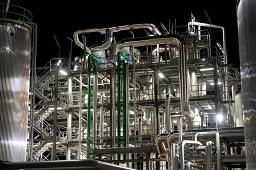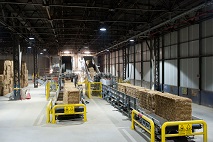‘As a company, we want to feed the world, save CO2, move to a greener and more biobased economy, improve lives. But we always want to remain innovation-based and bring innovation to the customer. In order to facilitate that, we need partnerships with companies that sell consumer products.’ Says Tina Sejersgård Fanø, Novozymes vice-president Business Operations EMA (Europe, Middle-East, Africa).

For an innovation-based company, Novozymes is quite sizeable. It is present on all continents and employs some 6.000 persons in total. Its name pops up, wherever enzymes and industrial biotechnology is involved. The company made a breakthrough in the production of enzymes that facilitate cleaning laundry at low temperatures, and then made a major contribution to the development of second generation (cellulosic) ethanol. And it keeps diversifying. The company now has its development laboratories not just in Denmark, but also in Brazil and China and (rapidly expanding) in the US. In the large main hall of EFIB in Reims, Tina and I sit at a modest table.
How do you look upon the relationship between first and second generation biofuels? What is your presence in the second generation? Do you expect biobased chemicals to become more important than biofuels?
The first generation biofuels sector is still the biggest and will remain so for quite some time, as it delivers a lot of value. The second generation now makes a take-off. We partner in second generation facilities, like the € 150 million plant in Crescentino in Italy (with Novamont), GranBio & Raizen in Brazil. Biomass conversion is Novozymes’ biggest growth bet. We successfully develop new technologies to break down cellulose from biomass into sugars that can be fermented into ethanol for use as a transportation fuel. Biomass conversion will allow getting more out of arable land, while contributing to decrease our dependence on oil and reduce GHG emissions. But also first generation products brings a lot of value in terms of job creation in rural areas, CO2 reduction and lower the dependency of oil.

First or second generation sugars can also be converted into various chemicals, thereby providing a renewable alternative to traditional petrochemicals. Biobased chemicals make a take-off now. For instance, we partner with BASF and Cargill in the production of biobased acrylic acid, used by BASF for the production of superabsorbent polymers. We have a strong presence in the market of industrial enzymes as a whole. At present, our market share is 48% (DSM 6%, Dupont 20%, others 26%).
Do you expect investments in biorefineries in Europe in this decade? Could small scale biorefineries (< € 20 million) be successful? What factors decide size?
What is a biorefinery? You could include biogas production on the farm as a biorefinery unit. then there is your small-scale biorefinery. But in general, a large scale is required in order to be cost-effective. Economy of scale is the reason why the Crescentino plant is big. And that will prove to be valid for quite a number of plants. Green energy might be produced at a small scale. For that market, the old Danish saying holds: many streams make a big river.

Can you tell us something about your cooperation with Monsanto? Goals? Strategy?
We partner with Monsanto because they have access to field trials and to markets. They in turn need our R&D capacity. As a result of this alliance BioAg, our R&D in agriculture has increased enormously. We expect to hire some 100 new scientists and invest about DKK 200 million ($ 35 million) in BioAg R&D over the next couple of years, including the build-up of a new research facility in North Carolina. At present, we have hired 80 scientists already in this project. Within the alliance, Novozymes is responsible for production and supply of the microbial solutions to Monsanto, while Monsanto leads field testing, registration and commercialisation of all alliance products. The aim is to deliver an entirely new category of more effective microbial solutions for global broad-acre crops, fruit and vegetables. For example, some of our biofertility products grow along the root of a plant making more soil and fertiliser phosphate available to the plant, so that the farmer achieves greater crop yields with the same amount of fertiliser. Other products aim to provide protection from pests and diseases.
Many people have wondered why you entered this alliance. Personally, I would count my fingers after shaking hands with them. I fear that world food supply might indeed be endangered if patents on seeds (as enforced by Monsanto) would apply everywhere. In Europe we have the system of grower’s rights that allow others to build upon one’s results (i.e. seeds), paying dues to acquire that right; a system that promotes rather than kills innovation in the chain. And we know companies that have killed all innovation after having been taken over by Monsanto.
What I can say about the cooperation is that we have found a very committed partner and that our objective is clear: to speed up BioAg’s global potential and to enable farmers to produce more from their land while conserving more of the world’s resources.
You being Danish, the concept of rural development must mean something to you. Do you think that the products of your company contribute to rural development?
Yes, I do. And we are happy to do so. In commodities like biofuels, there are many jobs to be created. And not just in the industrialised countries. With our biological solutions, we aim to create better business, a cleaner environment and better lives. And in doing so, address key societal challenges such as a growing population to feed, increased pressure on resources, and climate change.
